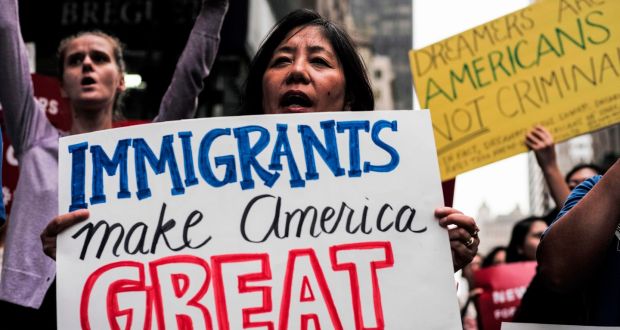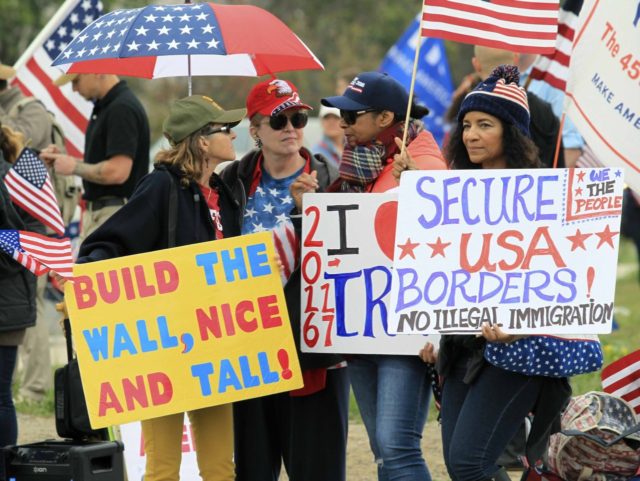Amid ongoing reports about new immigration proposals from President Donald J. Trump’s administration, it can be challenging to track change and continuity. What might appear as unprecedented moves are often intensifications of trends begun under previous administrations. Yet important parameters of the U.S. immigration conversation are evolving, and it is worth considering how these transformations are part of a broader shift in the current administration’s foreign policy.

One of the latest developments entails the Trump administration threatening greater tariffs on Mexican goods in pursuit of reducing Central American migration arrivals at the southern border. This proposal is novel in several ways, and threats of its implementation remain in effect ahead of Mexican legislators voting to approve the recently announced U.S.-Mexico agreement on irregular migration.
This framework would involve the deployment of Mexico’s National Guard to its border with Guatemala and the expansion of the Migration Protection Protocols mandating the return of some asylum seekers to Mexico to await adjudication of their cases. Earlier attempts to implement the “Remain in Mexico” asylum component faced legal obstacles, and court cases involving asylum seekers impacted by the policy are still pending.
Enduring Themes in US Immigration Conversation
Pressuring the Mexican government to crack down on northward migration as a means to reduce migration arrivals was also a strategy used by Barack Obama. In 2014, his administration facilitated a massive growth in Mexico’s immigration enforcement regime to apprehend Central Americans fleeing intensifying violence in Guatemala, Honduras, and El Salvador.
The previous U.S. funding and invigoration of a Mexican “deportation regime” reminds us of important through lines that weave together complex tapestries of U.S. migration policy and discourse. Such patterns include U.S. political leaders using the language of “illegal immigration” to emphasize threats to border security, defending migrant detention conditions and expedited removal procedures that violate international standards, and linking irregular migration with criminality.
Enduring themes in the U.S. immigration conversation also include the blurring of diverse categories of migrants and the racialization of certain migrant groups.
While these and other trends stretch back well before the current administration, there are some substantial changes in the U.S. immigration conversation that connect to larger changes in U.S. foreign policy.
Shifting Responsibility
Political arguments cautioning against “illegal immigration” have often focused on irregular migrants as aggressors or law-breakers. The language used by the current administration, however, reconfigures notions of culpability to place the blame more explicitly on other countries.
In recent tweets and speeches, for example, President Trump constructed Mexico as “wrong,” “doing nothing,” and contributing to burdens on U.S. taxpayers. Assertions that “we want Mexico to stop” because “our country is full” shift responsibilities for migration onto the Mexican government.
The Mexican culpability framing in Trump’s Pennsylvania speech of last month notably followed remarks that “foreign countries liked it much better when they could push us around, rip us off, and make us pay for the privilege of handing over our jobs and handing over our wealth.”
Similarly, justifications for cutting aid to Central American countries earlier in 2019 offered logics in which “it’s very unfair when we give money to Guatemala and to Honduras, and to El Salvador, and they do nothing for us.” While the elimination of U.S. aid intended to address the root causes of current displacement raises concerns, this language reflects broader imagery used in the Trump administration’s approach to foreign policy.
The United States said it would not offer any more aid to El Salvador, Guatemala and Honduras unless they take "concrete actions" to deter undocumented migrants from heading for the US https://t.co/3UfbZ3KLcm
— AFP News Agency (@AFP) June 17, 2019
Shifting the focus onto Mexican and Central American culpability enables immigration policy to be conceived in terms of America First foreign policy approaches that involve standing up to other countries and making them do more of their “fair share” – a rhetorical mechanism and worldview also embedded in the administration’s criticisms of international institutions like NATO and the United Nations.
This linkage of immigration rhetoric with rhetoric justifying U.S. retreats from global arrangements represents a subtle but substantial shift from the language used by recent administrations.
Reframing Refugees and Asylum Seekers
Another important shift involves refugees and asylum seekers. Such groups constitute distinct humanitarian categories of migration encompassing individuals fleeing violence and persecution. Past U.S. policies toward these groups sometimes violated international human rights principles in crucial ways, but refugee admission ceilings between 1980 and 2016 averaged roughly 100,000 per year across Republican and Democratic administrations.
Under the current administration, admissions have fallen below 30,000, and there is arguably something unprecedented in the extent to which refugees and asylum seekers have become rhetorically merged with “terrorists” and “illegal immigrants.”
Justifications of “zero tolerance” policies criminalizing asylum seekers have deepened conflations of irregular migrants seeking humanitarian protection with “law-breaking,” despite this interpretation being at odds with international standards.

Similarly, justifications for halting refugee resettlement on the basis that certain national origins constitute security threats surrounded the implementation of the travel ban and helped mainstream new modes of talking about refugees as aggressors (rather than victims) who are undeserving of U.S. protection.
These evolutions in domestic political discourse bolster a broader America First-framed retreat in international politics from global refugee responsibility sharing and international human rights.
While disaggregating change and continuity remains a challenging endeavor, a distinct intertwinement by the Trump administration of immigration and foreign policy rhetoric has the potential to reshape how both policy areas are understood among legislators and the public. Language shifting responsibility for migration and international cooperation onto other countries makes it easier to ignore how past U.S. policy actions have shaped current situations.
If the conversation is oriented at Mexican and Central American culpability, for example, it is not focused on how U.S. foreign policy created some of the underlying conditions driving displacement. If the conversation concentrates on how refugees from Middle Eastern countries might be ISIS infiltrators, attention is diverted from U.S. culpability in the emergence of ISIS and intensification of violence in the region.
These logics, along with America First logics justifying retreats from global arrangements, enable a kind of collective forgetting and an avoidance of accountability regarding the extent to which U.S. obligations are intrinsically rooted in its policy actions.
Disclaimer: The views and opinions expressed here are those of the author and do not necessarily reflect the editorial position of The Globe Post.




















